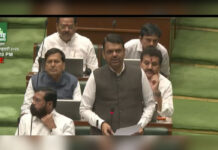X: @vivekbhavsar
Mumbai: The Pakistan government’s latest amendments to the Prevention of Electronic Crimes Act (PECA) has triggered widespread concerns over free speech. While the amendments reduce the jail term for spreading “fake news” online from seven years to three, they also impose stricter penalties, including a fine of 2 million rupees. Additionally, four regulatory bodies will be established to oversee digital content, raising fears of increased political control over social media.
PECA, originally enacted in 2016, has long been criticized as a tool to suppress dissent. More than 200 journalists have been investigated under the law. The Human Rights Commission of Pakistan (HRCP) strongly opposed the latest changes, warning that they could be used to target journalists and activists.
Despite resistance from leading media organizations such as the Pakistan Federal Union of Journalists (PFUJ), All Pakistan Newspapers Society (APNS), and the Council of Pakistan Newspaper Editors (CPNE), both houses of parliament approved the bill. President Asif Ali Zardari, representing the Pakistan People’s Party (PPP) —a party known for advocating democracy and press freedom — signed it into law.

Nationwide Protests and Opposition
Following the bill’s passage, journalists and media workers staged nationwide protests. PFUJ President Afzal Butt labelled the amendments a “black law” and vowed continued demonstrations. The International Federation of Journalists (IFJ) and the Karachi Bar Association (KBA) have also denounced the law, calling it regressive and a threat to democratic values.
Political opposition has emerged as well. PTI leader Asad Qaiser condemned the law as an effort to stifle independent media and vowed to challenge it. Other parties, including Jamaat-e-Islami and Jamiat Ulema-e-Islam (Fazl), have also expressed strong disapproval.
Growing Concerns over Free Speech
Pakistan has already faced criticism for internet restrictions and media censorship. The country ranks 152nd out of 180 in the 2024 World Press Freedom Index (WPFI) by Reporters Without Borders (RWB). Observers warn that the current government could eventually find itself targeted by the same laws it has enacted, as has happened in the past.
Punjab Information Minister Azma Bukhari’s suggestion that social media should be blocked if it cannot be controlled has further fuelled concerns. Prime Minister Shehbaz Sharif, who had previously opposed similar laws under Imran Khan’s government, but has now remained silent, drawing accusations of hypocrisy. Many have pointed out how a PECA-related ordinance was struck down by the Islamabad High Court in 2022 for violating fundamental rights — yet now, a similar law has been enacted under Sharif’s leadership.
While some hope the judiciary will intervene again, others fear the government’s growing authoritarian tendencies may prevent any legal challenge. Journalists like Sibghat Ali from Abbottabad worry that state control over the press is tightening beyond reversal.
With these amendments, Pakistan’s global standing on press freedom is likely to deteriorate further. Many critics argue that the government is using the guise of combating “fake news” to justify censorship. As history has shown, however, those in power today could soon find themselves on the receiving end of these very laws.
For now, Pakistan’s free press and civil society remain under siege.








where can i get generic clomiphene without dr prescription cost clomid prices get generic clomiphene for sale can i buy generic clomid no prescription buying cheap clomid clomid generic cost rx clomiphene
This website positively has all of the tidings and facts I needed about this participant and didn’t identify who to ask.
More text pieces like this would make the web better.
azithromycin 500mg us – order tindamax without prescription buy flagyl paypal
order rybelsus 14mg – purchase cyproheptadine pills cheap periactin
Cncbet Adalah Bandar Judi Bola Terlengkap & Terpercaya #1 Di Indonesia
order domperidone 10mg sale – order sumycin 500mg generic order flexeril 15mg pill
purchase amoxil without prescription – purchase ipratropium pills ipratropium over the counter
buy augmentin 625mg pills – https://atbioinfo.com/ ampicillin oral
purchase nexium pills – nexiumtous buy nexium 40mg pill
buy warfarin without a prescription – blood thinner buy cozaar without a prescription
purchase meloxicam pill – swelling order meloxicam 7.5mg pill
deltasone 5mg sale – https://apreplson.com/ prednisone 20mg cost
medicine for impotence – ed pills online erection problems
cheap amoxicillin for sale – brand amoxil buy amoxicillin tablets
buy fluconazole generic – https://gpdifluca.com/# buy diflucan generic
order lexapro without prescription – escita pro buy escitalopram no prescription
cenforce 50mg tablet – cenforce 100mg generic cenforce 50mg over the counter
tadalafil and sildenafil taken together – https://ciltadgn.com/# natural cialis
cialis 20mg tablets – https://strongtadafl.com/ tadalafil lowest price
buy ranitidine no prescription – https://aranitidine.com/# order ranitidine 300mg generic
buy viagra uk boots – https://strongvpls.com/# buy viagra rio janeiro
This is the kind of advise I turn up helpful. https://buyfastonl.com/furosemide.html
More posts like this would bring about the blogosphere more useful. site
More posts like this would prosper the blogosphere more useful. https://ursxdol.com/propecia-tablets-online/
I’ll certainly bring to review more. https://prohnrg.com/product/orlistat-pills-di/
More posts like this would persuade the online space more useful. notice fildena 25 mg
prescription drugs without prior prescription
canadian pharmacieswith no prescription
canada pharmaceutical online ordering
online pharmacy without prescription
canada drugs
rx online
prescription drugs online
prescription drugs without doctor approval
canadian prescription
mexican mail order pharmacy
online drug
This is the description of topic I take advantage of reading. https://ondactone.com/spironolactone/
This website really has all of the information and facts I needed about this thesis and didn’t positive who to ask.
maxolon ca
Thanks for putting this up. It’s evidently done. http://www.gtcm.info/home.php?mod=space&uid=1157024
forxiga where to buy – forxiga price buy dapagliflozin generic
buy generic orlistat – https://asacostat.com/ xenical 120mg tablet
I’ll certainly carry back to review more. http://bbs.51pinzhi.cn/home.php?mod=space&uid=7112847
You can conserve yourself and your family nearby being wary when buying pharmaceutical online. Some druggist’s websites operate legally and provide convenience, solitariness, bring in savings and safeguards as a replacement for purchasing medicines. buy in TerbinaPharmacy https://terbinafines.com/product/requip.html requip
This is the kind of enter I recoup helpful. fildena en ligne
I couldn’t weather commenting. Profoundly written!
online canadian discount pharmacy
苹果签名,苹果超级签平台,ios超级签平台ios超级签苹果企业签,苹果超级签,稳定超级签名
canada drug pharmacy
Tham gia cộng đồng game thủ tại Go88 để trải nghiệm các trò chơi bài, poker phổ biến nhất hiện nay.
Với giao diện mượt mà và ưu đãi hấp dẫn, MM88 là lựa chọn lý tưởng cho các tín đồ giải trí trực tuyến.
Tham gia cộng đồng game thủ tại Go88 để trải nghiệm các trò chơi bài, poker phổ biến nhất hiện nay.
Für diejenigen, die nach den wirklich großen Gewinnen suchen, bietet Kinbet Casino eine Auswahl an Jackpot-Spielen. Steigen Sie in den VIP-Stufen auf, um höhere Auszahlungslimits, persönliche Account Manager und exklusive Boni zu erhalten. Jede Stufe bietet Ihnen zusätzliche Chancen, Ihr Spielerlebnis zu maximieren.
Durch Interaktion mit Croupiers und Mitspielern entsteht echtes Casinoflair. Die Boni sind auf verschiedene Einzahlungshöhen zugeschnitten und somit für Freizeitspieler wie Highroller gleichermaßen interessant. Spieler aus den USA, dem Vereinigten Königreich, Schweden und weiteren Staaten dürfen sich nicht registrieren oder spielen. Ziel ist es, modernste Spieltechnologie mit einer benutzerfreundlichen Oberfläche zu kombinieren – für Gelegenheitsspieler ebenso wie für erfahrene Casinofans.
Öffnen Sie jederzeit den Chatroom oder schauen Sie sich die Gutscheinkarte an, bevor Sie spielen. Mit 30-maligem Durchspielen in 3 Tagen können Sie bis zu €200 aus diesen Drehungen behalten. Damit Sie spielen können, anstatt zu warten, haben wir dafür gesorgt, dass alles klar, schnell und fair war. Filtern Sie nach Anbietern, Funktionen oder Gewinnlinien und starten Sie dann nach der Anmeldung den Demomodus, um ein Gefühl dafür zu bekommen, wie die Dinge funktionieren, bevor Sie spielen. Als Teil unseres Willkommenspakets erhalten Sie passende Guthaben und Freispiele zu klaren Konditionen.
References:
https://online-spielhallen.de/hitnspin-casino-osterreich-jetzt-spielen-800-bonus/
Our Puntit casino review highlights its game collection of 5,000+ titles. While its primary focus is sports betting, the site also delivers a superb casino experience. The casino is also one of the most established brands in the international gambling markets and operates legally in the Indian market, too.
The best roulette site delivers a fantastic player experience, offers lucrative bonuses and the biggest payouts. This is yet another reason to stick with the tried and true online casinos for roulette listed on this website. Each casino has its own software so you will need to download new software from every online casino for roulette games to work.
References:
https://blackcoin.co/ready-to-cast-some-winning-spells/
Fakagekkie rated a casino Bitstarz is good if your loyal to the one casino I can’t say anything negative about ths casino. Great for both fiat and crypto users. A long-standing favorite, BitStarz excels with its fast withdrawals, top-notch customer service, and massive game library. 40 times is one of the highest bonus wagering I do.
BitStarz management reserves the right to void any bonuses and/or winnings obtained through fraudulent behavior. Deposit bonuses cannot be stacked. However, if no cash balance is available the bet placed will be deducted from the player’s bonus balance.
Failure to do so will disqualify you from receiving the bonus retroactively. Kindly note that if your balance drops below $0.10 or currency equivalent, the bonus will be forfeited. If you choose to cancel the bonus, the bonus and all winnings attributed to the bonus will be lost. If, while playing at BitStarz Casino, you win a sum regarded by BitStarz Management as worthy of publicity, you agree to make yourself available for any event of such nature arranged by BitStarz. Examples of minimal risk bets include betting on red and black simultaneously in Roulette, and betting player and banker simultaneously in Baccarat. Any “free spin” or “bonus” winnings resulting from bonus funds after the bonus has been wagered, lost or forfeited shall be removed.
References:
https://blackcoin.co/woospin-premier-pokies-paradise-for-aussie-players-in-2025/
online pokies paypal
References:
http://dodo00.dothome.co.kr/bbs/board.php?bo_table=1_2&wr_id=411506
online casinos mit paypal
References:
https://www.refermee.com/companies/best-paypal-casinos-2025-100-real-money-paypal-sites-%EF%B8%8F/
pharmacies with no prescription
pa bet mgm online casino betmgm play betmgm Massachusetts
Indulge in the glamour of high-stakes gaming from home. crown coins casino official website provides cryptocurrency options for fast transactions. Experience the rush and reap the rewards!